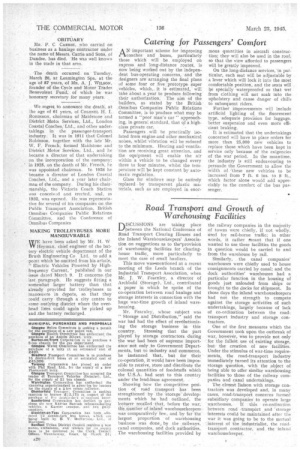Road Transport and Growth of Warehousing Facilities
Page 22

If you've noticed an error in this article please click here to report it so we can fix it.
DISCUSSIONS are taking place between the National Conference of Road Transport Clearing Houses and the Inland Warehousekeepers' Association on suggestions as to the'provision of warehousing facilities for clearinghouse traffic, more particularly to meet the case of small hauliers.
This move was-mentioned at a recent meeting of the Leeds branch of the Industrial Transport Association, when Mr. J. W. Fearnley, a director of Archbold (Storage), Ltd., contributed a paper in which he spoke of the co-operation between road haulage and storage interests in connection with the huge war-time growth of inland warehousing.
Mr. Fearnley, whose subject was " Storage and Distribution," said the war had had the effect of revolutionizing the storage business in this country. Stressing that the part played by storage contractors, during the war had been of supreme importance not only to Government Departments, but to industry and commerce, he instanced that, but for their co-operation, it would have been impos: sible to receive, store and distribute the Colossal quantities of foodstuffs which the U.S.A. had sent to this country under the lend-lease agreement.
Showing how the competitive pciaition of road transport has been strengthened by the storage.-.developments which he had outlined, the lecturer recalled that, before the .war; theoieridier of inland warehousekeeperso was comparatively few, and by far the largest proportion of warehousing business was done, by the _railways, canal companies, and dock authorities, The warehousing facilities provided by
the railway companies in the majority of towns were chiefly, if not wholly, used for rail-borne traffic; in other words, it rather meant that if one wanted to use these facilities the goods in question would be carried to and from the warehouse by rail.
Similarly, the canal companies' warehouses were chiefly used to house consignments carried by canal; and the dock authorities' warehouses had a particular function in the housing of goods just unloaded from ships or brought to the docks for shipment. In those days the inland warehousekeepers had not the strength to compete against the storage activities of such undertakings, largely because of lack of co-ordination between the roadtransport industry and storage contractors.
One of the first measures which the Government took upon the outbreak of war, however, was to provide not only for the fulleSt. use of existing storage, but the creation of new facilities. Under the stimulus of war-time requirements, the road-transport industry immediately turned its attention to the storage question, with the object of being able to offer similar warehousing facilities to those of the railway companies and canal undertakings.
The closest liaison with storage contractors was developed and, in many cases, road-transport concerns formed subsidiary companies to operate large warehouses_ If this co-ordination -between road -transport and storage interests could be maintained after the war it was going to be to the mutual . interest of the .industrialist, the roadtransport contractor, and the inland warehousekeeper.




















































